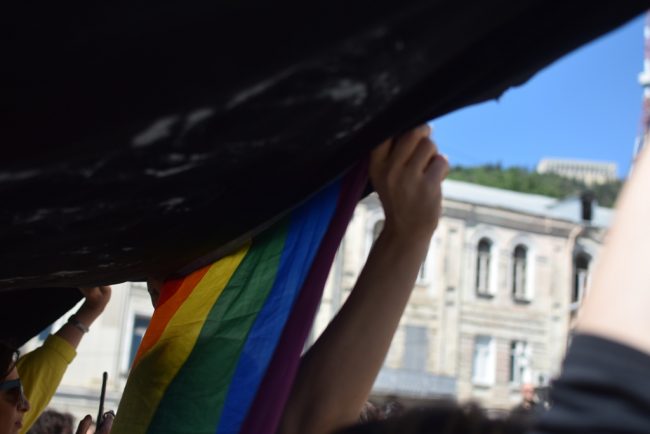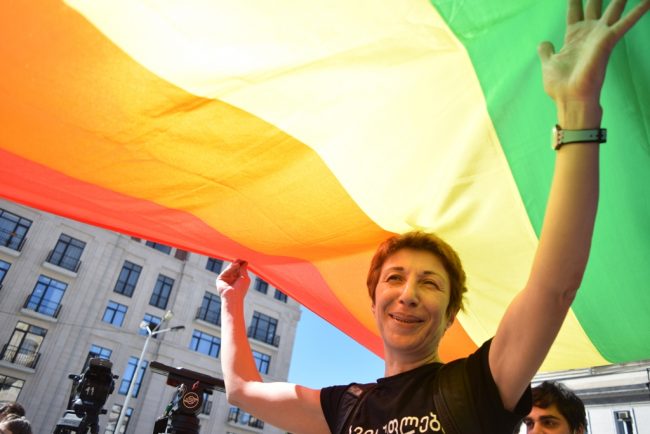

Queer rights activism has come a long way in Georgia, but faced with rising homophobia, cooperation within the movement is crucial now more than ever.
Two important things happened for the LGBT community last year in Georgia. First, we had our first ever openly lesbian candidate running for office — a seat on the Tbilisi City Council. Second, the Republican Party published a policy document proposing same-sex civil partnerships.
Both of these initiatives have faced criticism, with accusations that the Republicans are simply pandering to more progressive voters, (though definitely not to the country’s conservative majority) or that civil partnerships are a distraction from more important issues. But whatever their value, it is undoubtedly clear that queer rights activism in Georgia has born fruit, and may now be entering a new and crucial stage.
But there is still a long way to go. According to a number of polls, the level of homophobia is increasing from year to year, and every third member of the LGBT community faces physical violence because of their sexual orientation or gender identity. Surveys conducted by several organisations (CRRC, NDI, ACT) in the last decade or so show that attitudes towards LGBT people are extremely negative, with over 90% of respondents saying they do not approve of homosexuality.
But this homophobic environment is not the only obstacle facing Georgia’s LGBT movement today — internal issues within the movement are also holding us back.
The NGOisation of human rights
Following the dissolution of the Soviet Union, Western countries invested in developing governmental structures and civil society in Georgia. In order to guarantee accountability, groups that wanted access to financial support had to register as NGOs. This meant that human rights activism in independent Georgia was born in an institutionalised form.
Together with strong allies in other human rights groups, queer NGOs have achieved a lot, including a higher degree of mobilisation in the LGBT community (recently stretching into the regions as well), and improvements to legislation, as well as better implementation of the law. Collection and analysis of data about the situation for queer people in the country has also become regular, and the visibility of the movement has increased.
But the movement has also grown fragmented.
Since NGOs represent the bulk of our movement, they are able to establish contact with governmental structures. This also means they have a high degree of access to Georgia’s international partners, such as the UN, EU, and others.
But this also means they have had to learn to compete for resources amongst each other and with our allies, and are limited in their choice of tools and methods. There are currently four community based LGBT organisations in Georgia, and despite using similar tools to improve the situation of LGBT people in the country, we have still not mastered the art of cooperation.
This is one reason community empowerment is not applied systematically, and this harms the creation of safe spaces for socialisation, mental health assistance, and distributing information on gender and sexuality.
Most international donors believe that the state should be the main service provider, which means the movement finds it difficult to fund such services. But neither the government nor society is ready to commit funding for such purposes.
Without more focus on providing services and empowering the community, the importance of the work we do in lobbying, advocacy, and litigation loses much of its relevance, especially to those facing violence and discrimination on a daily basis.
In other words, we end up having improved legislation but very few community members ready to apply it. It’s clear that this can be remedied only with more focus on building solidarity and sharing resource within the community.
Grassroots activism

NGOs, by their very nature, are limited in their political choices and often have to avoid forms of activism that are perceived as more radical or risky. These can include more aggressively calling out politicians, criticising donor policies, and even occupying buildings, mostly when it comes to conflicts with the private sector or states institutions.
The situation started changing in 2011, when the Independent Group of Feminists was founded. This was the first vocal feminist group to refuse to register as an NGO, precisely to avoid the limitations described above.
Nowadays, we see many other groups following a similar strategy, groups like the Young Greens and Women’s Gaze often include LGBT issues on their agenda.
This diversity of movements is good, as it leads to a higher degree of mobilisation and makes the processes more horizontal.
This has seen some positive results, with the 2017 demonstration on International Day Against Homophobia, Transphobia, and Biphobia on 17 May being a great example.
After peaceful demonstrations in 2012 and 2013 were attacked, we have been struggling to reclaim the space shamelessly taken away from us by the Orthodox Church and conservative groups.
Over the following years we have endured many more such insults, and I believe that they hurt enough for NGOs (both community based and general human rights groups), individual activists, and feminist collectives came together to co-organise the demonstration in 2017.
The demonstration itself, with all its security measures and limitations, is a different topic entirely, but what’s important here is that so many different groups came together in planning the event. This sent a clear message to society at large and to each other within the movement, that such crucial issues cannot be limited to the agenda of one or two human rights groups. This should be a common effort.
What comes next
It’s clear that we all need to understand that there is ultimately no right form of activism, and different strategies and tactics can and should co-exist. But one thing is absolutely crucial — we need to communicate and coordinate with each other. While such conversations do take place, they need to become a systemic part of our agenda-setting.
Communication skills in our country, whether in civil society or in public spaces, are not the strongest, and we need to see how damaging it is to talk to each other in a way that fragments the movement instead of consolidating it. With more and more empowered citizens willing to get involved in standing up for their rights, and for the rights of others, we need to put up a united front against hate.
Obviously, we all have different ideas about the best ways to continue the fight, but whatever form this takes, we need to talk to each other. We have worked hard for the space to open up and for some room to breathe — now what we need to do, is to fight on together.
The opinions expressed in this article are author’s alone, and do not necessarily reflect the views of OC Media’s editorial board. The article was amended on 17 February 2018.









